On October 25th, 2025, following almost half a year of rigorous and focused preparations, the mainline automatic welding production of ADNOC West to East Pipeline (WEP) Section III was officially commenced in the mountainous area of Fujairah, UAE, by Deping Technology.
WEP project extends 500km in total, starting from Ruwais, Abu Dhabi, ending at Fujairah Port, UAE’s only main oil terminal facing the Indian Ocean. It is a critical infrastructure that on which UAE depends to realize diversified and safe crude oil transportation
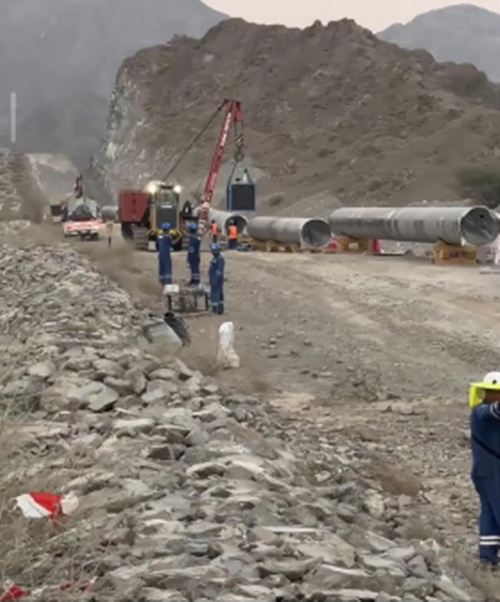
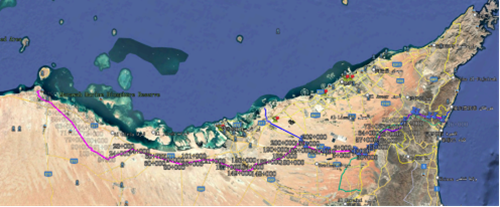
WEP Section III totals 110km in length, 46km of which goes through the mountains of Fujairah. This section features rugged, continuously rising ridges, with slopes exceeding 25° across most areas. The corridor is densely intersected by wadi areas, access tracks, highways, railways, tunnels, bridges, underground utilities, and in-service pipelines, creating substantial number of interruptions, crossings, and tie-ins to pipeline installation and posing significant challenges to pipe shifting and stringing, material transportation, welding, and lowering operations.
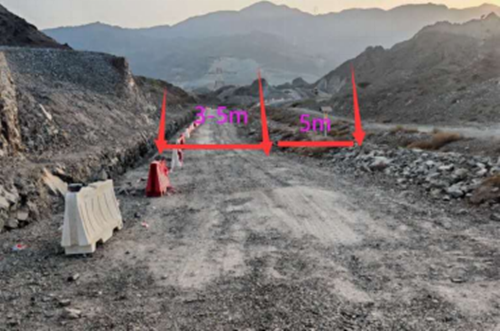
As a result, the project faced significant challenges even during the bidding phase. Several leading international contractors ultimately withdrew, citing the high construction complexity, demanding technical requirements, and considerable cost uncertainties. Deping, however, distinguished itself by securing the award through its solid technical foundation, advanced welding techniques, innovative construction solutions, specialized equipment, proven management approach, and a well-controlled and predictable cost structure.
Compared with the contractors of Sections I and II, who invested substantial manpower and resources over several months in repeated PQT trials, Deping’s small yet highly specialized technical team successfully completed the mainline welding qualification within less than one month. This achievement not only earned unanimous recognition from both the owner and clients but also significantly enhanced their confidence in Deping’s capability to successfully execute this pipeline project, which has been described as “hellishly difficult.”
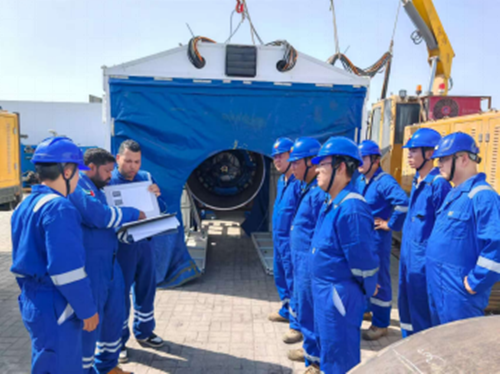
"A journey of a thousand miles begins with a single step." Successful completion of the welding procedure qualification in only one attempt, with both high quality and efficiency, is underpinned by decades of relentless pursuit of excellence in automatic welding and construction technologies for cross-country pipelines. Just two weeks before the commencement of this project, Deping successfully completed an offshore automatic welding project in Southeast Asia. In that project, Deping’s automatic welding system completed 2,966 consecutive welds with an exceptionally low repair rate of just 0.027%. This outstanding performance once again provides compelling evidence of Deping’s industry-leading capability in automatic welding technologies.
Deping technical team conducted a thorough study of the project, focusing on addressing key challenges and critical pain points in the construction process. To overcome the difficulty of transporting pipes in mountainous terrain using conventional trailers, the Deping team developed a dedicated pipe carrier based on a six-wheel-drive chassis. This vehicle is capable of carrying steel pipes weighing approximately 10 tons, climbing up slopes exceeding 20°, and safely and efficiently transporting pipes from the laydown yard to the construction site.
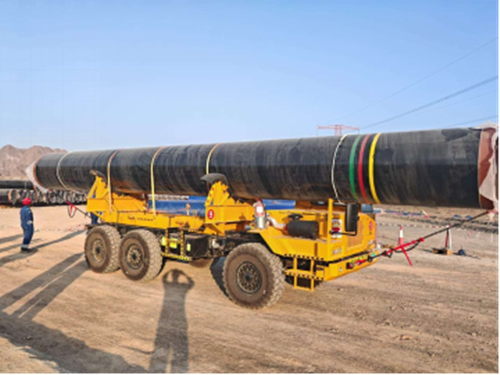
The primary bottleneck restricting welding efficiency in the mountainous section is pipe alignment. Conventional sideboom pipelayers have limited climbing capability, and maintaining equipment stability on steep slopes is extremely difficult. Operator visibility is also severely compromised, posing significant safety risks where even minor errors can lead to serious accidents.
To resolve this challenge, Deping team conducted extensive upgrades to high-power excavators and developed a dedicated “pipe grab and fit-up platform”. By integrating a chassis pitch-levelling system, the platform maintains a safe center of gravity while climbing steep slopes with a clear visibility for the operator. A hydraulic stabilization system further enhances platform stability on slopes, enabling safe execution of subsequent pipe lifting and fit-up operations.
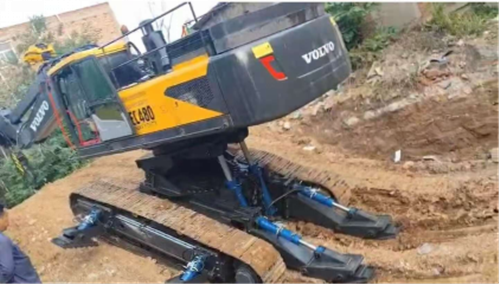
To maximize efficiency in pipe unloading and fit-up, Deping team also engineered a flexible gripping system tailored to pipe fit-up workflow. Compared with conventional rigid pipe grabs, this system not only provides secure handling of the pipe but also enables precise angular adjustment—and even rotation—of pipe through a delicate hydraulic mechanism. When used in combination with the new hydraulic internal line-up clamp that is capable of steep-grade climbing and passing 5D bends, the fit-up time for large-diameter pipes in mountainous area can be reduced to less than 30 minutes. This integrated solution has significantly enhanced operational safety and ensured that the automatic welding system can perform at its maximum productivity.
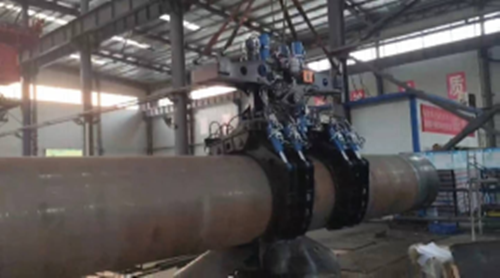
Commencement of the mainline automatic welding signifies that most of the technical and construction challenges have been systematically resolved through the persistent efforts of Deping team, and that the construction of Section III has now entered its most critical phase., the construction of WEP Section III has entered its most critical phase. Supported by advanced technologies, purpose-built equipment, and a highly experienced technical team, Deping remains committed to upholding the highest standards of safety, quality, and efficiency throughout this project. Moving forward, Deping will continue to drive progress through innovation and excellence, ensuring the project is delivered on schedule and to the highest standards, contributing to ADNOC’s strategic objective of enhancing the security and resilience of the UAE’s national energy infrastructure!
Copyright 2019@ Luoyang Deping Technology Co., Ltd. ALL Rights Reserved